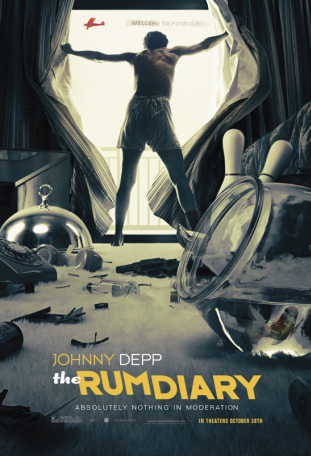By Alexei C. Summers (The Cascade) – Email
Print Edition: November 9, 2011
 The Rum Diary is a fast paced whirlwind journey through the strange 1960s American wasteland of the Caribbean island of Puerto Rico, seen through the eyes of Paul Kemp, a thinly-disguised alias for the story’s original author – Dr. Hunter S. Thompson. Thompson previously collaborated with director Terry Gilliam in the production of the film adaptation of his major non-fiction gonzo work, Fear and Loathing in Las Vegas, as well as with director Art Linson in an earlier adaptation of the same story – the film was called Where the Buffalo Roam and it starred Bill Murray as Hunter S. Thompson. This time, Hunter was unable to give his approval to any of the film, as he committed suicide in his home in Woody Creek, Colorado in 2005. Nevertheless, the film turned out very well. Although true die-hard Hunter S. Thompson fans might be a little disappointed at how the film changed major aspects of the plot of the novel. Of course, it would’ve been nigh impossible to transfer the novel into film as it was.
The Rum Diary is a fast paced whirlwind journey through the strange 1960s American wasteland of the Caribbean island of Puerto Rico, seen through the eyes of Paul Kemp, a thinly-disguised alias for the story’s original author – Dr. Hunter S. Thompson. Thompson previously collaborated with director Terry Gilliam in the production of the film adaptation of his major non-fiction gonzo work, Fear and Loathing in Las Vegas, as well as with director Art Linson in an earlier adaptation of the same story – the film was called Where the Buffalo Roam and it starred Bill Murray as Hunter S. Thompson. This time, Hunter was unable to give his approval to any of the film, as he committed suicide in his home in Woody Creek, Colorado in 2005. Nevertheless, the film turned out very well. Although true die-hard Hunter S. Thompson fans might be a little disappointed at how the film changed major aspects of the plot of the novel. Of course, it would’ve been nigh impossible to transfer the novel into film as it was.
Many key details have been changed, and much of the original novel was not incorporated into the film. Characters were dropped, and some were changed completely. The character of Sanderson (portrayed by Aaron Eckhart) was based on a character from the novel. The character in the film is a rich, manipulative public relations consultant/real estate mogul with cruel intentions and ulterior motives. Yet, in the novel, the same character is a poor journalist working on the paper along with Kemp. The film is Bruce Robinson’s first film in 19 years, and it is rumoured in cinematic circles that he broke six years of sobriety while writing it, drinking as much as a bottle a day. Given the film’s subject matter, this is not entirely unlikely. The drinking in the film is highly exaggerated for the audience’s pleasure. In the book, much less drinking occurs than it does on-screen. Also disappointing was Amber Heard’s portrayal of the character Chenault, Paul Kemp’s love interest in the film. While she looked the part, she spoke about five lines in the entire film, all of which were fluffy flirtatious remarks with veiled undertones of sexuality – and because of her character’s lack of involvement in the story she was little more than candy for the eyes of the audience, and one found it hard to understand why Kemp was so drawn to her.
Throughout the film we see a young journalist confronted with the problem of “The Bastards,” as he refers to them. He is faced with the problem of the poverty on the island; he sees the disparity between the rich Americans getting off the boats and planes to come take advantage of the beautiful island, and the poor locals who seem to be forced into shacks and huts for the sake of those same Americans. As the film progresses, and Mr. Kemp sees more and more poverty, and drinks more and more rum, he becomes both disillusioned and fascinated with the American dream, and from that disillusionment, the idealistic, altruistic, chaotic, and deeply flawed character of Dr. Hunter S. Thompson is born – and we see a transformation on screen as he becomes the same beloved character from Fear and Loathing in Las Vegas. There is even a scene where we see Mr. Kemp discovering psychedelic drugs – something which plays heavily in Fear and Loathing.
Depp’s portrayal of Kemp is quirky, fun and convincing. He is more or less playing the same character from Fear and Loathing (minus the shaved head), though this movie is certainly chronologically a prequel, and is set many years before the aforementioned American saga through the heart of the world’s gambling capital. While the film has not received very positive reviews from most of the major professional film reviewers—many believe the film missed its mark—this journalist, for one, quite enjoyed the film.




